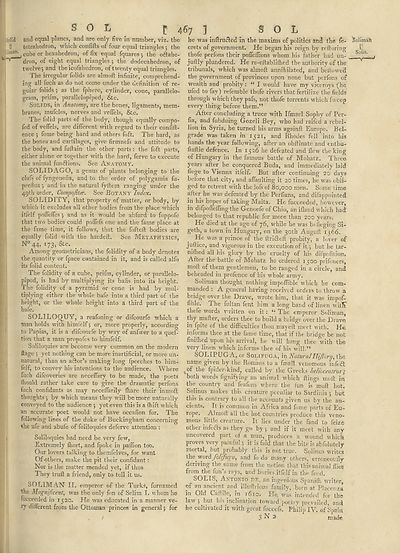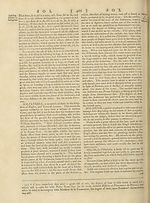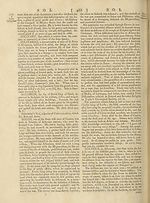Encyclopaedia Britannica, or, a Dictionary of arts, sciences, and miscellaneous literature : enlarged and improved. Illustrated with nearly six hundred engravings > Volume 19, Scripture-SUG
(513) Page 467
Download files
Complete book:
Individual page:
Thumbnail gallery: Grid view | List view

SOL F 467 1 SOL
•Solid and equal planes, and are only five in number, viz. the
it tetrahedron, which confifts of four equal triangles; the
iman', cube or hexahedron, of fix equal fquares ; the odahe-
dron, of eight equal triangles ; the dodecahedron, of
twelve; and the icofahedron, of twenty equal triangles.
The irregular folids are almoft infinite, comprehend¬
ing all fuch as do not come under the definition of re¬
gular folids ; as the fphere, cylinder, cone, parallelo¬
gram, prifm, parallelepiped, &c.
Solids, in Anatomy, are the bones, ligaments, mem¬
branes, mufcles, nerves and veflels, &c.
The folid parts of the body, though equally compo-
fed of veffels, are different with regard to their confid¬
ence ; fome being hard and others foft. The hard, as
the bones and cartilages, give firmnefs and attitude to
the body, and fuftain the other parts: the foft parts,
either alone or together with the hard, ferve to execute
the animal funftions. See Anatomy.
SOLIDAGO, a genus of plants belonging to the
clafs of fyngenefia, and to the order of polygamia fu-
pertlua ; and in the natural fylfem ranging under the
49th order, Compojitce. See Botany Index.
SOLIDITY, that property of matter, or body, by
which it excludes all other bodies from the place which
itfelf poflelfes ; and as it would be abfurd to fuppofe
that two bodies could poffefs one and the fame place at
the fame time, it follows, that the fofteft bodies are
equally folid with the hardeft. See Metaphysics,
N° 44, 173, &c.
Among geometricians, the folidity of a body denotes
the quantity or fpace contained in it, and is called alfo
its folid content.
The folidity of a cube, prifm, cylinder, or parallele¬
piped, is had by multiplying its bafis into its height.
The folidity of a pyramid or cone is had by mul¬
tiplying either the whole bafe into a third part of the
height, or the whole height into a third part of the
bafe.
SOLILOQUY, a reafoning or difcourfe which a
tnan holds with himfelf; or, more properly, according
to Papias, it is a difcourfe by way of anfwer to a quef-
tion that a man propofes to himfelf.
Soliloquies are become very common on the modern
fiage ; yet nothing can be more inartificial, or more un¬
natural, than an a&or’s making long fpeeches to him¬
felf, to convey his intentions to the audience. Where
fuch difcoveries are neceffary to be made, the poets
firould rather take care to give tire dramatic perfons
| inch confidants as may necelfarily {hare their in moil
thoughts; by which means they will be more naturally
conveyed to the audience ; yet even this is a drift which
an accurate poet would not have occafion for. The
following lines of the duke of Buckingham concerning
the ufe and abuie of foliloquies deferve attention :
Soliloquies had need be very few,
Extremely {hurt, and fpoke in paflion too.
Our lovers talking to themfelves, for want
Of others, make the pit their confidant :
Nor is the matter mended yet, if thus
They trull a friend, only to tell it us.
SOLIMAN II. emperor of the Turks, furnamed
■the Magnificent, was the only fon of Selim I. whom he
lucceeded in 1520. He was educated in a manner ve¬
ry different from the Ottoman princes in general; for
he was inftru&ed in the maxims of politics and the fie- Sofimah
crets of government. He began his reign by reftoring 1!
thofe perfons their poffedions whom his father had un- ° 1S'.
juftly plundered. He re-eftablifhed the authority of the
tribunals, which was almoft annihilated, and bellowed
the government of provinces upon none but perfons of
wealth and probity : “ I would have my viceroys (he
ufed to fay) refemble thofe rivers that fertilize the fields
through which they pafs, not thofe torrents which fweep
every thing before them.”
Alter concluding a truce with Ifmael Sophy of Per-
fia, and fubduing Gozeli Bey, who had raiftd a rebel¬
lion in Syria, he turned his arms againft Europe. Bel¬
grade was taken in 1521, and Rhodes fell into his
hands the year following, after an obftinate and enthu-
fiaftic defence. In 1526 he defeated and flew the king
of Hungary in the famous battle of Mohatz. Three
years after he conquered Buda, and immediately laid
liege to Vienna itfelf. But after continuing 20 days
before that city, and affaulting it 20 times, he was obli¬
ged to retreat with the lofsof 80,000 men. Some lime
after he was defeated by the Perfians, and difappointed
in his hopes of taking Malta. He fucceeded, however,
in difpofleflingthe Genoefeof Chio, an ifland which had
belonged to that republic for more than 200 years.
He died at the age of 76, while he was befieging Si-
geth, a town in Hungary, on the 30th Auguft 1366.
He was a prince of the ftri&eft probity, a lover of
juftice, and vigorous in the execution of it; but he tar-
mftied all his glory by the cruelty of his difppfitiom
After the battle of Mohatz he ordered 1500 prifoners,
moft of them gentlemen, to be ranged in a circle, and
beheaded in prefence of his whole army.
Soliman thought nothing impoflible which he com¬
manded : A general having received orders to throw a
bridge over the Drave, wrote him, that it was impof-
fible. d he fultan fent him a long band of linen ivitli
thofe words written on it : “ The emperor Soliman,
thy mafter, orders thee to build a biidge over the Drave
in fpite of the difficulties thou mayeft meet with. He
informs thee at the fame time, that if the bridge be not
finifhed upon his arrival, he will hang thee with the
very linen which informs thee of his will.”
SOLIPUG A, or Solifuga, in NaturalHijlory, the
name given by the Romans to a fmall venomous infeft
jof the fpider-kind, called by the Greeks hehocentros,*
both words fignifying an animal which flings moft in
the. country and feafons where the fun is°moft hot.
Solinus makes this creature peculiar to Sardinia ; but
this is contrary to all the accounts given us by the an¬
cients. It is common in Africa and fome parts of Eu¬
rope. Almoft all the hot countries produce this veno¬
mous little creature. It lies under the fand to feize
othei infebts as they go by ; and if it meet with anv
uncovered part of a man, produces a wound which
proves very painful ; it is faid that the bite is abfolutely
mortal, but probably this is not true1. Solinus writes
the.word fol’fuga, and fo do many others, erroneouily
deriving the name from the notion that this animal flics
from the fun’s rays, and buries itfelf in the fand.
SOLIS, Antonio de, an ingenious Spanifh writer,
of an ancient and illuftrious family, born at Piacenza
in Old Caftile, in 1610. Hev was intended for the
law ; but his inclination toward poetry prevailed, and
he cultivated it with great fuccefs. Philip IV. of Spain
3 NT 3 made
•Solid and equal planes, and are only five in number, viz. the
it tetrahedron, which confifts of four equal triangles; the
iman', cube or hexahedron, of fix equal fquares ; the odahe-
dron, of eight equal triangles ; the dodecahedron, of
twelve; and the icofahedron, of twenty equal triangles.
The irregular folids are almoft infinite, comprehend¬
ing all fuch as do not come under the definition of re¬
gular folids ; as the fphere, cylinder, cone, parallelo¬
gram, prifm, parallelepiped, &c.
Solids, in Anatomy, are the bones, ligaments, mem¬
branes, mufcles, nerves and veflels, &c.
The folid parts of the body, though equally compo-
fed of veffels, are different with regard to their confid¬
ence ; fome being hard and others foft. The hard, as
the bones and cartilages, give firmnefs and attitude to
the body, and fuftain the other parts: the foft parts,
either alone or together with the hard, ferve to execute
the animal funftions. See Anatomy.
SOLIDAGO, a genus of plants belonging to the
clafs of fyngenefia, and to the order of polygamia fu-
pertlua ; and in the natural fylfem ranging under the
49th order, Compojitce. See Botany Index.
SOLIDITY, that property of matter, or body, by
which it excludes all other bodies from the place which
itfelf poflelfes ; and as it would be abfurd to fuppofe
that two bodies could poffefs one and the fame place at
the fame time, it follows, that the fofteft bodies are
equally folid with the hardeft. See Metaphysics,
N° 44, 173, &c.
Among geometricians, the folidity of a body denotes
the quantity or fpace contained in it, and is called alfo
its folid content.
The folidity of a cube, prifm, cylinder, or parallele¬
piped, is had by multiplying its bafis into its height.
The folidity of a pyramid or cone is had by mul¬
tiplying either the whole bafe into a third part of the
height, or the whole height into a third part of the
bafe.
SOLILOQUY, a reafoning or difcourfe which a
tnan holds with himfelf; or, more properly, according
to Papias, it is a difcourfe by way of anfwer to a quef-
tion that a man propofes to himfelf.
Soliloquies are become very common on the modern
fiage ; yet nothing can be more inartificial, or more un¬
natural, than an a&or’s making long fpeeches to him¬
felf, to convey his intentions to the audience. Where
fuch difcoveries are neceffary to be made, the poets
firould rather take care to give tire dramatic perfons
| inch confidants as may necelfarily {hare their in moil
thoughts; by which means they will be more naturally
conveyed to the audience ; yet even this is a drift which
an accurate poet would not have occafion for. The
following lines of the duke of Buckingham concerning
the ufe and abuie of foliloquies deferve attention :
Soliloquies had need be very few,
Extremely {hurt, and fpoke in paflion too.
Our lovers talking to themfelves, for want
Of others, make the pit their confidant :
Nor is the matter mended yet, if thus
They trull a friend, only to tell it us.
SOLIMAN II. emperor of the Turks, furnamed
■the Magnificent, was the only fon of Selim I. whom he
lucceeded in 1520. He was educated in a manner ve¬
ry different from the Ottoman princes in general; for
he was inftru&ed in the maxims of politics and the fie- Sofimah
crets of government. He began his reign by reftoring 1!
thofe perfons their poffedions whom his father had un- ° 1S'.
juftly plundered. He re-eftablifhed the authority of the
tribunals, which was almoft annihilated, and bellowed
the government of provinces upon none but perfons of
wealth and probity : “ I would have my viceroys (he
ufed to fay) refemble thofe rivers that fertilize the fields
through which they pafs, not thofe torrents which fweep
every thing before them.”
Alter concluding a truce with Ifmael Sophy of Per-
fia, and fubduing Gozeli Bey, who had raiftd a rebel¬
lion in Syria, he turned his arms againft Europe. Bel¬
grade was taken in 1521, and Rhodes fell into his
hands the year following, after an obftinate and enthu-
fiaftic defence. In 1526 he defeated and flew the king
of Hungary in the famous battle of Mohatz. Three
years after he conquered Buda, and immediately laid
liege to Vienna itfelf. But after continuing 20 days
before that city, and affaulting it 20 times, he was obli¬
ged to retreat with the lofsof 80,000 men. Some lime
after he was defeated by the Perfians, and difappointed
in his hopes of taking Malta. He fucceeded, however,
in difpofleflingthe Genoefeof Chio, an ifland which had
belonged to that republic for more than 200 years.
He died at the age of 76, while he was befieging Si-
geth, a town in Hungary, on the 30th Auguft 1366.
He was a prince of the ftri&eft probity, a lover of
juftice, and vigorous in the execution of it; but he tar-
mftied all his glory by the cruelty of his difppfitiom
After the battle of Mohatz he ordered 1500 prifoners,
moft of them gentlemen, to be ranged in a circle, and
beheaded in prefence of his whole army.
Soliman thought nothing impoflible which he com¬
manded : A general having received orders to throw a
bridge over the Drave, wrote him, that it was impof-
fible. d he fultan fent him a long band of linen ivitli
thofe words written on it : “ The emperor Soliman,
thy mafter, orders thee to build a biidge over the Drave
in fpite of the difficulties thou mayeft meet with. He
informs thee at the fame time, that if the bridge be not
finifhed upon his arrival, he will hang thee with the
very linen which informs thee of his will.”
SOLIPUG A, or Solifuga, in NaturalHijlory, the
name given by the Romans to a fmall venomous infeft
jof the fpider-kind, called by the Greeks hehocentros,*
both words fignifying an animal which flings moft in
the. country and feafons where the fun is°moft hot.
Solinus makes this creature peculiar to Sardinia ; but
this is contrary to all the accounts given us by the an¬
cients. It is common in Africa and fome parts of Eu¬
rope. Almoft all the hot countries produce this veno¬
mous little creature. It lies under the fand to feize
othei infebts as they go by ; and if it meet with anv
uncovered part of a man, produces a wound which
proves very painful ; it is faid that the bite is abfolutely
mortal, but probably this is not true1. Solinus writes
the.word fol’fuga, and fo do many others, erroneouily
deriving the name from the notion that this animal flics
from the fun’s rays, and buries itfelf in the fand.
SOLIS, Antonio de, an ingenious Spanifh writer,
of an ancient and illuftrious family, born at Piacenza
in Old Caftile, in 1610. Hev was intended for the
law ; but his inclination toward poetry prevailed, and
he cultivated it with great fuccefs. Philip IV. of Spain
3 NT 3 made
Set display mode to:
![]() Universal Viewer |
Universal Viewer | ![]() Mirador |
Large image | Transcription
Mirador |
Large image | Transcription
Images and transcriptions on this page, including medium image downloads, may be used under the Creative Commons Attribution 4.0 International Licence unless otherwise stated. ![]()
| Permanent URL | https://digital.nls.uk/192701951 |
|---|
| Attribution and copyright: |
|
|---|
| Description | Ten editions of 'Encyclopaedia Britannica', issued from 1768-1903, in 231 volumes. Originally issued in 100 weekly parts (3 volumes) between 1768 and 1771 by publishers: Colin Macfarquhar and Andrew Bell (Edinburgh); editor: William Smellie: engraver: Andrew Bell. Expanded editions in the 19th century featured more volumes and contributions from leading experts in their fields. Managed and published in Edinburgh up to the 9th edition (25 volumes, from 1875-1889); the 10th edition (1902-1903) re-issued the 9th edition, with 11 supplementary volumes. |
|---|---|
| Additional NLS resources: |
|

